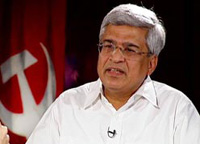India's communists strongly oppose US nuclear deal

India's communist parties have renewed their opposition to a landmark nuclear energy deal with the United States, saying they would force early elections if the government keeps trying to finalize it.
The deal has been touted by the Indian government as crucial to meeting the country's growing energy needs and to bring it into the nuclear mainstream after decades of outsider status.
The four communist parties in India's Parliament have opposed the pact because it would strengthen ties to the U.S. and because of concerns that it would allow the U.S. to influence Indian foreign policy. But they have gone back and forth in supporting the government on the issue.
The U.S.-India deal aims to reverse three decades of American anti-proliferation policy by letting the U.S. send nuclear fuel and technology to India, which has been cut off from the global atomic trade because of its refusal to sign nonproliferation treaties and its testing of nuclear weapons.
The leader of the Communist Party of India (Marxist) made the party's strongest statement yet protesting the deal and the government's talks with the International Atomic Energy Agency.
"When they return after talks with IAEA, we'll tell them not to proceed further," Prakash Karat, the party's general-secretary, told an internal party meeting over the weekend, Times Now television channel reported Sunday. "The matter will have to be closed by December end."
Karat added that if the government did not end talks on the nuclear deal it should be prepared for early elections, Times Now said.
The head of India's Department of Atomic Energy, Anil Kakodkar, and IAEA chief Mohamed ElBaradei met in Vienna last month to begin discussions on an India-specific safeguards agreement.
After months of suggesting that they would pull support from the Congress party-led ruling coalition over the nuclear agreement, last month the CPI (M) had said the government could go ahead with talks with the U.N. nuclear watchdog, but must seek its approval before any agreement takes effect.
Phone calls to communist party leaders for comment went unanswered Monday.
Before the deal is signed, it must also be approved by the Nuclear Suppliers Group a body of nations that export nuclear material. It also must face another review by the U.S. Congress, where some members have expressed concerns that the extra fuel could boost India's nuclear bomb stockpile.
There are concerns that could spark a nuclear arms race in the region, where India's neighbors Pakistan and China already have nuclear weapons.
Subscribe to Pravda.Ru Telegram channel, Facebook, RSS!


